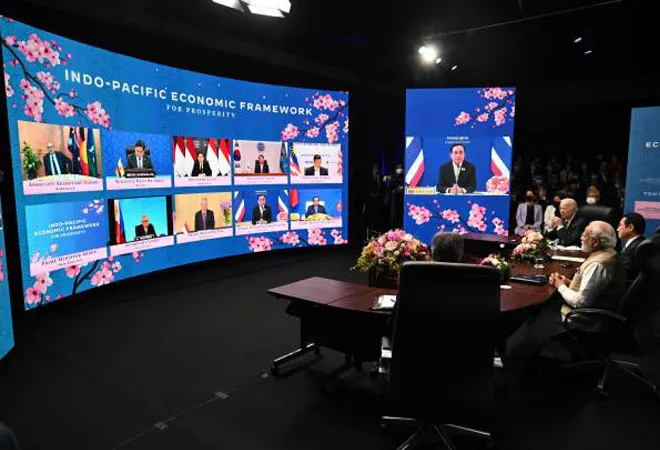-
CENTRES
Progammes & Centres
Location

On May 24, a day prior to the second in-person summit of the Quad leaders in Tokyo, the Prime Ministers of India, Japan and Australia and the US President launched a new economic initiative called the Indo-Pacific Economic Framework (IPEF), along with Indonesia, South Korea, Malaysia, New Zealand, Philippines, Singapore, Vietnam, Thailand and Brunei making up its 13 current members. The launch of this new-age economic arrangement, which is unlike the traditional trade pacts among countries, clearly outlines the Quad’s “open” and “inclusive” approach to the Indo-Pacific and renewed multilateralism in the region.
With IPEF, the Quad countries have further reinforced their Indo-Pacific partnership. It is expected to strengthen geo-economics not only amongst them but also across the Indo-Pacific expanse, with its members together accounting for 40% of world GDP. Technically, it seeks to strengthen economic cooperation and enhance inclusiveness, resilience, sustainability, fairness, economic growth and competitiveness in the region. Symbolically, it shows a collective desire to make the region the engine of global growth.
The IPEF has been touted as an economic pact that would not negotiate tariffs or market access. It primarily seeks integration with the participating countries on issues of trade, supply chains, clean energy, decarbonization, infrastructure, and tax and anti-corruption. It is likely to seek a collective approach to boosting regional trade cooperation, improving transparency, and managing crises such as the Covid-19 pandemic and future crises through the development of initiatives like the Coalition for Disaster Resilient Infrastructure.
India’s signing of the Comprehensive Economic Partnership Agreements with Japan, South Korea and Singapore and also its simultaneous negotiations on the Free Trade Agreement with the ASEAN countries clearly outlines the momentum in its Act East policy.
The third aspect of IPEF -- based on the lines of the Paris Agreement -- aims to promote the development of sustainable and durable infrastructure through cross-cutting innovations in technology.
The fourth aspect of IPEF deals with capacity-building by sharing expertise, largely to sustain an open, transparent and rules-based order in the Indo-Pacific region.
India’s decision to join the IPEF bolsters its “activism” under its ‘Act East' policy and also sits well with its overall Indo-Pacific orientation. In years past, India’s trade in the Indo-Pacific has grown rapidly. New Delhi’s overseas investments are now being heavily directed to the East. India’s signing of the Comprehensive Economic Partnership Agreements with Japan, South Korea and Singapore and also its simultaneous negotiations on the Free Trade Agreement with the ASEAN countries clearly outlines the momentum in its Act East policy.
Also, the overlap between the ASEAN outlook and the statement of the Quad summit 2022 reiterates the shared interests and values amongst the countries of the Indo-Pacific region. Therefore, with further convergence of mutual interests and shared values amongst the Quad members and member countries of the IPEF, the development seems to resonate well with India’s broader objectives in the Indo-Pacific region.
India also recently joined the Combined Maritime Taskforce (CMF), a counterterrorism and counterpiracy grouping in the Arabian Sea.
Apart from the IPEF, India recently also became a member of the WEF-led First Movers Coalition. This, too, is meant to enhance cooperation at the multilateral level in the Indo-Pacific. It relies on seeking cooperation between members on climate-oriented approaches to infrastructure, supply chain resilience, and fair practices. For India, it has also meant that through the IPEF, it will seek greater cooperation and accountability from the ASEAN and BIMSTEC groupings in the Indo-Pacific, as many countries that are part of these are also part of the IPEF.
For India, the move to join the IPEF is consistent with other recent trends in the expansion of its multilateral goals and increasing responsibilities in the Indo-Pacific region. India also recently joined the Combined Maritime Taskforce (CMF), a counterterrorism and counterpiracy grouping in the Arabian Sea. For a long time, India had avoided joining the CMF. However, its three foundational agreements with the US now make it easier for it to collaborate and coordinate in parts of the northern Indian Ocean, including in the Arabian Sea. Since China operationalised its naval base at Djibouti in 2017, the northern Indian Ocean has gradually figured on the strategic radar of both the US and India. The IPEF could very well be the launch pad for boosting India’s economic capacities in the western Indian Ocean, as much as on its eastern flank.
Beyond its promise, the IPEF is at a nascent stage, and it remains to be seen how it is implemented. What might potentially irk other members of the IPEF is the link that the US has drawn with its domestic interests, particularly the IPEF as being focused on “American Workers”, drawing on an interest-based, protectionist outlook. There is a need for some caution as similar previous initiatives by the US, such as the Blue Dot Network and Build Back Better, have made little progress.
This commentary originally appeared in Deccan Herald.
The views expressed above belong to the author(s). ORF research and analyses now available on Telegram! Click here to access our curated content — blogs, longforms and interviews.

Vivek Mishra is Deputy Director – Strategic Studies Programme at the Observer Research Foundation. His work focuses on US foreign policy, domestic politics in the US, ...
Read More +